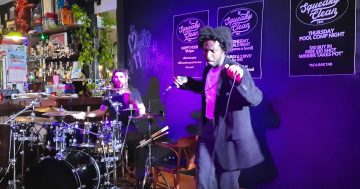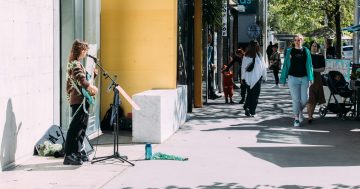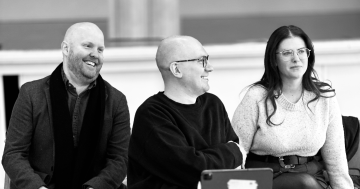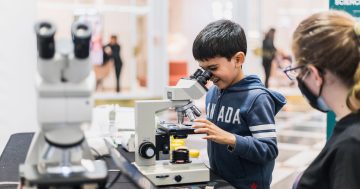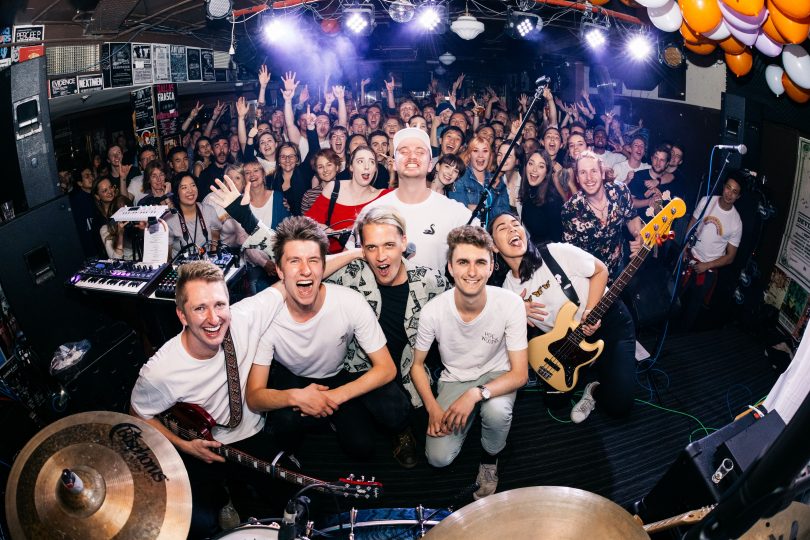
Don’t we miss it – Canberra band ARCHIE celebrates at a sold-out show at the old Transit bar. Photo: Harry Chalker.
No-one imagined that in a 12-month period we’d witness such disruption and anguish in the music industry in the ACT, throughout Australia and around the world.
Why the music industry and all of its people are precious and important contributors to our cultural, social and economic lives does not require much explanation. We all know the joy of making and listening to music, no matter your background or the state of your life.
Music always finds our passion.
So what’s happened to the music industry? In dollar terms, consulting giant PWC says, “Australia’s live and recorded music market was valued at $1.1 billion in 2020, a decline of nearly 39 per cent on the previous year, driven almost entirely by the suspension of the live music industry, which shed 90 per cent of its revenue, at $86 million.”
Playing live is the most important step in building a music career in the ACT; it is the creative crucible where tunes are tested and income is made to invest in recordings, promotions and tours.
All live music venues are now closed. They are typically the businesses first hit and the last to recover.
Even during that long period in the ACT during COVID-19’s delta ‘donut days’, music venues were stuck with reduced capacities, reduced ticket sales and limited bar turnover.

Sputnik Sweetheart performing at Cultural Centre Kambri. Photo: Claire Warren.
What can be done by Canberrans?
There is one thing right now: get behind ‘Our Soundtrack Our Stories’.
The initiative is an open invitation from the music industry to all of us to discover, champion, share, and consume more local music. It is thanks to Holly Rankin – aka Jack River – who posted a now viral call-to-arms to get behind homegrown music as it struggles under a new wave of lockdowns.
‘Our Soundtrack Our Stories’ calls for a public commitment from media and businesses to increase the inclusion of diverse local artists in the commercial and mainstream landscape.
Canberra is home to more than 1000 APRA AMCOS (Australasian Performing Right Association and Australasian Mechanical Copyright Owners Society) registered songwriters, and many more recording artists, so by simply playing a MusicACT curated list of tunes through your licensed music streaming platform, it will generate musician income.
Here is how you can help local artists if you are a public facing business or organisation:
- Make sure you are playing homegrown music in your store or business, including obtaining the right licence, so artists can get properly reimbursed for their music. You can find out what licence is most applicable to your business by visiting OneMusic Australia.
- Play a radio station that champions local artists.
- Seek out the services of a background music supplier to help curate the sound of your business. MusicACT is also building ACT playlists across a variety of genres to meet diverse needs, linked here.
- Share your commitment and links to ‘Our Soundtrack Our Stories’ on your business and personal social media channels, and encourage your followers to do the same.
- Set yourself a goal and share your commitment to using more local music, and keep your followers up to date on your progress.
There are further music industry initiatives and campaigns coming, including leveraging the power of contemporary music artists to drive COVID-19 vaccination uptake so we can all safely get back to our favourite venues and enjoy live gigs again.
Daniel Ballantyne is the director of MusicACT, which supports all aspects of the music industry by providing advice, access to resources, information and professional development.














